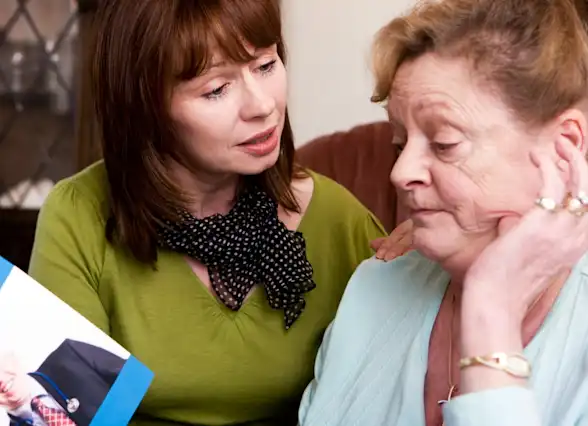Why Won't They Just Quit Smoking?
The top reason is because they are addicted, thought that's not the only reason or the end of the story.
Get insurance benefits, legal documents, and medical records in one place

Helpful Highlights
Quitting smoking is the #1 thing a person who smokes can do for their health.
Quitting smoking is much more difficult than non-smokers can imagine and than former smokers remember.
Helping your loved one quit means being supportive versus critical and judgmental.
There are many proven ways to help them quit smoking.
First, understand addiction
Addiction is a psychological state, unlike tolerance or physical dependence which are physiological states. One does not necessitate the other, though they often accompany one another. Psychological states are much more difficult to overcome. With that, nicotine addiction works like any other drug addiction. Persons with addiction use drugs for two reasons:
They increase dopamine release, creating pleasure, reducing pain, and altering the senses (the "high"). They are constantly chasing the high.
To avoid negative physical effects (withdrawal symptoms).* They are constantly avoiding the low.
*Withdrawal symptoms and intensity vary based on the drug. With nicotine, people experience powerful cravings, shakiness, irritability, increased appetite, headaches, gut problems, problems thinking and focusing, sleep disturbances, coughing and congestion, and even anxiety and depression. With other substances, like opiates, withdrawal includes uncontrollable tremors, profuse sweating, vomiting, diarrhea, and significant physical pain. Withdrawal from alcohol can lead to hallucinations and even be life-threatening.
And like persons with addiction, people who smoke will do whatever is necessary to ensure they get cigarettes, including spending money they don't have on cigarettes, relighting old cigarette butts, "bumming" cigarettes from others or even stealing them when feasible, taking frequent smoke breaks during working hours or trying to hide it while on the job, smoking in non-smoking areas, leaving at inopportune times to go buy cigarettes, and blowing up over little inconveniences and at those around them when they need a cigarette.
If you have not struggled with addiction, you do not know how hard it is to quit smoking. While your loved one must first choose to quit, quitting is not as easy as simply making that choice. Likewise, you must understand that neither judging them for smoking nor being critical is helpful. Judging and criticism are vastly different from support.
Then, know it's not just addiction
Smoking is an addiction because nicotine is addictive, but there are many layers to why someone smokes that go beyond addiction, and you must understand them.
It's comforting. Even though smoking increases heart rate and blood pressure, and has been shown to increase anxiety and stress, nicotine creates an immediate sense of physical relaxation, so people smoke in the belief it reduces stress and anxiety.
It's a distraction. Like that immediate sense of physical relaxation, smoking also serves as a distraction when things become mentally overwhelming - or oppositely - it serves as a cure for boredom.
It's a social demand. Depending on where your loved one spends much of their time, or who they spend their time with, smoking may be the norm. This is especially true in casinos, member lodges (VFW, Elks, Moose, etc.), garages and workshops, during outdoor activities or tasks, and while traveling.
It's triggered by a lot of things. Smoking has more triggers than any other addiction. Coffee, alcohol, driving, after meals, social settings, working or creating, being outdoors, secondhand smoke, being around people who smoke (even if they aren't smoking), certain places and occasions, and more.
It's a habit. A habit, while not an addiction, is still incredibly hard to break. You know this if you have ever tried to stop drinking coffee in the morning, stop biting your nails, stop checking your phone so frequently, or stop eating when you're bored or tired. Being an addiction and a habit makes smoking doubly difficult to quit.
It's a sense of security. People who smoke may feel a renewed or ongoing sense of safety and security. While this might seem strange, it likely has to do with the feeling of assuredness that one experiences while engaging in a routine or established pattern.
There are additives. Many chemical additives in cigarettes may increase nicotine absorption or otherwise make them more addictive (among other things), increasing the hold of addiction and making it that much harder to quit.
So, what can I do to help them quit?
A LOT.
Foremost, be patient, and brace yourself for them to make several quit attempts before they are successful. Providers believe that it takes 5-7 quit attempts before someone successfully stops smoking, while the CDC suggests 8-11 attempts.
Just remember that each quit attempt is a step forward. Each quit attempt is practice for quitting for good. With every attempt, your loved one learns more about themselves, including what works for them to help stave off triggers and cravings. Each attempt gets them that much closer to quitting smoking for life.
Recognize that warnings and attempts to elicit fear are rarely effective, such as alarming statistics, details about chronic disease, or pictures of diseased organs. Neither is bargaining (also known as guilting), for example, "Don't you want to be here to see your grandson graduate?" These things may be informative, but they are not in themselves persuasive and can come across as invasive and critical.
Encourage your loved one to talk with their provider about a quit plan. The provider may have advice on how to quit smoking that’s best for their situation.
Consider refusing to purchase cigarettes for your loved one and direct family and friends to do the same. This is very difficult for everyone involved, not only because some family members and friends may feel that your loved one should be able to smoke if they want, but also because this approach can make your loved one very upset, with reactions including crying and begging, screaming and berating, or escalating to the point where they shut you out of their lives for a time.
Let them know that you will purchase them nicotine replacement (NRT) products instead - patches, gum, lozenges. (Best if you get an okay from their provider before doing so.)
Be available to talk them through the first few days after quitting. They will feel discomfort of varying kinds and degrees as the nicotine leaves their system. Being aware of the symptoms helps you and your loved one know what to expect and plan ways to handle them. Acknowledge that after quitting, they may experience the symptoms outlined above, including temporary depression (because of the lull in dopamine jumps), and while these are certainly uncomfortable, they should only last a few weeks.
Also talk with them about certain places, occasions, and behaviors—such as drinking coffee, going out with friends, or particularly stressful events—that can bring up an urge to smoke even after withdrawal symptoms have ended. Identifying these situations and making changes to avoid them or a plan to cope with them is essential in helping your loved one on their way to living a completely smoke-free life.
And, lastly, you will likely not be able to help your loved one to quit smoking if you are a smoker yourself. You may have to help yourself quit before you can help them.
Are e-cigarettes or vaping safer than cigarettes?
While these may not have as many toxins as cigarette smoke (anywhere from 4,000-7,000 chemicals), they are not harmless, and they are not recommended as a means of helping your loved one get off cigarettes.
Hand-rolled tobacco is also no safer than manufactured cigarettes. In fact, loose tobacco has significantly more additives than manufactured cigarettes, including flavorings and humectants to keep the tobacco from drying out.
RESOURCES
American Heart Association (AHA) - Why it's So Hard to Quit Smoking
American Heart Association - Is Vaping Better than Smoking?
CDC - About Electronic Cigarettes (E-cigarettes)
CDC - Why Quitting Smoking is Hard
Chaiton, M., Diemert, L., Cohen, J.E., Bondy, S.J., Selby, P., Philipneri, A., & Schwartz, R. (2016). Estimating the number of quit attempts it takes to quit smoking successfully in a longitudinal cohort of smokers. BMJ Open, 6(6), e011045. DOI
FDA - Nicotine Is Why Tobacco Products Are Addictive
FDA - What It’s Like to Quit Smoking
Johns Hopkins Medicine - 5 Vaping Facts You Need to Know
Mannino, D.M. (2009). Why won't our patients stop smoking? Diabetes Care, 32(Suppl2), S426-S428. DOI
Mental Health Foundation (UK) - Smoking and Mental Health
Papke, R.L., Karaffa, M., Horenstein, N.A., & Stokes, C. (2022). Coffee and cigarettes: Modulation of high and low sensitivity α4β2 nicotinic acetylcholine receptors by n-MP, a biomarker of coffee consumption. Neuropharmacology, 216, 109173. DOI
Partnership for Health - Quit Smoking Guide
Rabinoff, M., Caskey, N., Rissling, A., & Park C. (2007). Pharmacological and chemical effects of cigarette additives. American Journal of Public Health, 97(11), 1981-1991. DOI
smokefree.gov - Why Quitting is Hard
Truth Initiative - How Big Tobacco Made Cigarettes More Addictive
No content in this app, regardless of date, should ever be used as a substitute for direct medical advice from your doctor or other qualified clinician.
Get more support and guidance on insurance benefits, medical records and legal forms.
Helpful brings together your insurance benefits, legal documents, and medical records in one personalized place — so you always know what you have, and never have to search again.

Simplifying Healthcare, Supporting Mental Health
An all-in-one solution to help navigate the complexities of healthcare and support for mental health, for you or your loved one.





